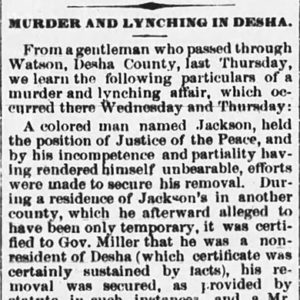calsfoundation@cals.org
Henry Jackson (Lynching of)
On October 4, 1877, an African-American man named Henry Jackson was shot by a masked mob near Watson (Desha County) for allegedly murdering a justice of the peace referred to only as Mr. O’Neil. However, the circumstances of the event speak to the broader efforts in post-Reconstruction Arkansas to remove black elected officials from office.
While it is impossible to identify O’Neil, there were two African Americans named Henry Jackson living in Desha County in 1870. The first was a twenty-nine-year-old farmer living in Red Fork Township who had personal property worth $500 and real estate valued at $250. The second was a twenty-seven-year-old farmer who was living in Jefferson Township and had personal property worth $125 and real estate worth $200.
After the Civil War, many African Americans were elected to local office in Arkansas, especially in majority black counties like Desha County. According to newspaper reports, Henry Jackson had been living in Desha County and was a justice of the peace. The Arkansas Gazette reported that he exhibited “incompetence and partiality,” thus rendering himself “unbearable.” (Such descriptions of black elected officials by the white press were common during Reconstruction and the years immediately following, when African Americans could still stand a chance of being elected.) Although attempts were made to remove him, they were unsuccessful. He then moved to another county but asserted that this was only temporary.
When Governor William Read Miller was notified that he had moved, Jackson was replaced by O’Neil. Jackson then returned to Desha County, and O’Neil asked him to surrender his papers. When he refused, he was arrested. By October 3, he had surrendered the papers and was released from jail. That night, while O’Neil was at home with his family, someone hiding in ambush shot and mortally wounded him. O’Neil, when asked if he had any enemies, could think only of Jackson.
Jackson was arrested on October 4, and enough circumstantial evidence was produced against him that it was “almost sufficient to secure conviction.” Although authorities put Jackson under a strong guard, a group of armed and masked men demanded his release. Their request was refused, whereupon members of the mob wounded several of the guards and fatally shot Jackson.
Such local coups d’état were common in Arkansas throughout this period as white Arkansans attempted to regain, through violence and conniving, political positions occupied by African Americans. For example, in 1888 in Crittenden County, a group of influential white citizens expelled by force black county officials and other prominent African Americans and then, with the blessing of Governor Simon Hughes, were able to have those positions declared vacant and subsequently filled by whites.
On October 18, 1877, Governor Miller appointed Walter B. Peterson to serve as justice of the peace.
For additional information:
“City and General Items.” Arkansas Gazette, October 19, 1877, p. 4.
“Murder and Lynching in Arkansas.” Memphis Public Ledger, October 8, 1877, p. 3.
“Murder and Lynching in Desha.” Arkansas Gazette, October 7, 1877, p. 4.
Nancy Snell Griffith
Davidson, North Carolina
 Civil Rights and Social Change
Civil Rights and Social Change Post-Reconstruction through the Gilded Age, 1875 through 1900
Post-Reconstruction through the Gilded Age, 1875 through 1900 Henry Jackson Lynching Article
Henry Jackson Lynching Article 




Comments
No comments on this entry yet.